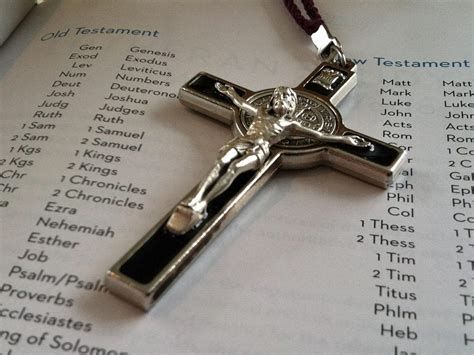Inclination to Sin, Mortal Sin & Venial Sin,
Loss of the Sense of Sin
Why are we inclined to sin?
The flesh has desires against the Spirit, and the Spirit against the flesh; these are opposed to each other, so that you may not do what you want. But if you are guided by the Spirit, you are not under the law. Now the works of the flesh are obvious: immorality, impurity, licentiousness, idolatry, sorcery, hatreds, rivalry, jealousy, outbursts of fury, acts of selfishness, dis sensions, factions, occasions of envy, drinking bouts, orgies, and the like. I warn you, as I warned you before, that those who do such things will not inherit the kingdom of God. In contrast, the fruit of the Spirit is love, joy, peace, patience, kindness, generosity, faithfulness, gentleness, self-control. Against such there is no law. Now those who belong to Christ [Jesus] have crucified their flesh with its passions and desires.
(Galatians 5:17-24)
Because of Original Sin we suffer from weakness in our will, intellect, and passions and are inclined to sin—an inclination called concupiscence. In order to avoid sin, we must rely on the grace of God and actively seek to choose good and to grow in holiness and virtue.
The sin of our first parents, called Original Sin, is "transmitted by propagation to all mankind" (CCC 404). As a result, every person is conceived in a fallen state that includes concupiscence, or the tendency to sin, which is now part of the human condition (cf. Gn 3:11; Council of Trent: DS 1515). Although Baptism washes away Original Sin, i.e., fills us with sanctifying grace by which we can triumph over temptation, the Sacrament does not remove concupiscence. (Cf. CCC 399-409, 978-979, 1264)
With our conscience, will, and intellect weakened, we must actively remain faithful and struggle to overcome our disordered passions—primarily our passions of the flesh, for material possessions, and for self-indulgence in pride. To master sin we must rely on God's grace and strive to master our selves. The struggle must go on for a lifetime. We are comprised of body and soul—flesh and spirit—and "the flesh" possesses passions that "the spirit" must control (cf. Galatians 5:16, 17, 24; Eph 2:3). The great gift of Christ's forgive ness—the grace given especially in the Sacrament of Penance as well as the practices of prayer and mortification for self-mastery—is an invaluable help in our continuing battle against sin. (Cf. Catechism of the Catholic Church 377, 418, 2514-2516)
The Catechism of the Catholic Church, paragraph 2515 addresses this question.
-The Didache Bible
What is the difference between Mortal sin and Venial sin?
The works of the flesh are obvious: immorality, impurity, licentiousness, idolatry, sorcery, hatreds, rivalry, jealousy, outbursts of fury, acts of selfishness, dissensions, factions, occasions of envy, drinking bouts, orgies, and the like. I warn you, as I warned you before, that those who do such things will not inherit the kingdom of God.
(Galatians 5:19-21)
Mortal sins are grave offenses that sever our friendship with God and, consequently, cause a loss of sanctifying grace. Anyone dying in a state of mortal sin would suffer eternal separation from God in
Hell. Venial sins are lesser offenses that injure but do not destroy one's relationship with God.
The gravity of each sin depends upon the nature of the sin itself and circumstances that may either increase or mitigate guilt for that sin. (Cf. CCC 1853-1854)
If anyone sees his brother sinning, if the sin is not deadly, he should pray to God and he will give him life. This is only for those whose sin is not deadly. There is such a thing as deadly sin, about which I do not say that you should pray. All wrongdoing is sin, but there is sin that is not deadly.
(1 John 5:16-17)
A mortal sin cannot be committed "accidentally"; willful or pretended ignorance of divine law does not excuse us and may in fact compound our guilt.
A mortal sin requires three conditions:
- The evil act must constitute "grave matter," a serious offense against God's law.
- The sinner must be fully aware that the act is indeed evil.
- The sinner must fully and freely consent to the evil act, even if he or she does not explicitly and directly wish to offend God. (Cf. CCC 1857-1860)
If any of these requirements is not met, then the sin is considered a venial sin. The sinner's relationship with God and the charity within his or her heart is weakened by venial sin but is not severed. (Cf. CCC 1862-1863)
Mortal sin results in the loss of sanctifying grace and thus requires recourse to the
Sacrament of Penance and Reconciliation before any of the other
Sacraments may be received, especially
the Eucharist in Holy Communion. Venial sins do not preclude the reception of Holy Communion. Nevertheless, the Church recommends frequent confession of venial sins to receive the sacramental grace that gives us the strength to overcome imperfections and habitual venial sins. It is important to bear in mind that venial sins can easily lead to mortal sin unless they are held in check. (Cf. CCC 1385,1415,1457-1458,1861)
The Catechism of the Catholic Church, paragraphs 1854-1855 addresses this question.
-The Didache Bible
We must recognize the seriousness of sin if we are truly to appreciate Christ's gift of forgiveness and reconciliation.
Centering our life on Jesus Christ brings a healthy realization of the evil effects of sin and instills the strong hope that it will be conquered.
(Cf. Catechism of the Catholic Church, paragraph 1848)
What do we mean by the "Loss of the Sense of Sin"?
If we say, "We are without sin," we deceive ourselves, and the truth is not in us. If we acknowledge our sins, he is faithful and just and will forgive our sins and cleanse us from every wrongdoing. If we say, "We have not sinned," we make him a liar, and his word is not in us.
(1 John 1:8-10)
Encourage yourselves daily while it is still "today," so that none of you may grow hardened by the deceit of sin.
(Hebrews 3:13)
The loss of the sense of sin involves an insensitivity to the truth that works of evil offend God, ruin our relationship with him, and have a destructive effect on society. A manifestation of this loss of the sense of sin is seen in the denial of objective moral truth or even of God himself. When questions of moral right and wrong are seen strictly as matters of personal opinion, the awareness of personal sin and its consequences is diminished. This dismissal of the moral law ultimately puts a person's salvation at risk.
God's moral law, interpreted and applied by the Church, forms our foundation for discerning good and evil. Sinful choices can cause this power of discernment to become so clouded that the person cannot effectively perceive the seriousness of sin (cf. CCC 37,1954-1955).
This diminishment of conscience, described as the "Loss of the Sense of Sin," has several causes:
- Moral relativism is an outlook that denies objective moral truth and allows indi viduals to judge the moral value of a given act based on circumstances, feelings, and opinion. If "truth" is subjective, then no one can speak meaningfully of "sin." (Cf. CCC 1790-1793)
- Faulty psychological theories characterize guilt and shame as disorders or repres sion instead of the fruits of a good conscience. These theories blame personal sins on traumas or developmental factors. From a Christian perspective, such factors may mitigate guilt for sin but do not necessarily erase personal responsibility. (Cf. CCC 387,1746)
- Confusion between "moral"and "legal" arises because civil and criminal laws do not always reflect divine law. Human laws cannot be trusted blindly and can lead to errors in moral judgment if they do not reflect the divine law. (Cf. CCC 1902,1959)
- Secular humanism seeks to improve society or enrich the human condition solely through human effort in areas such as technology, science, and political or eco nomic means with no reference to God or the moral law. Human efforts that either implicitly or explicitly reject God and his eternal law will have deleterious effects on society. (Cf. CCC 2124)
We must recognize the seriousness of sin if we are truly to appreciate Christ's gift of forgiveness and reconciliation. Centering our life on Jesus Christ brings a healthy realization of the evil effects of sin and instills the strong hope that it will be con quered. (Cf. CCC 1848)
The Catechism of the Catholic Church, paragraph 1865 addresses this question.
-The Didache Bible
Reconciliation
The Sacrament of Penance and Reconciliation, or simply Confession, was instituted by Christ to forgive those sins committed after Baptism.








